Unfortunately there doesn't seem to be any dedicated Data Science IDEs for Scala at this time. I think these would be your best options:
 This is basically a text editor with an output window which gets updated as often as you want. Eclipse has something similar, I just prefer IntelliJ.
This is basically a text editor with an output window which gets updated as often as you want. Eclipse has something similar, I just prefer IntelliJ.
Pros:
- Backed by IntelliJ's fantastic code completion, error checking, and sbt/maven integration.
- You can prototype within the same project setup as your actual development system (if you have one).
Cons:
- I am not aware of any caching/selective evaluation so the entire worksheet is evaluated each time you want an answer, something you may not want if you have some operations which take a long time to complete.
- No workspace variables window or plot integration.
 The Jupyter Notebook is a generalization of the iPython notebook which now supports dozens of interpreted languages (new kernels are being added all of the time).
The Jupyter Notebook is a generalization of the iPython notebook which now supports dozens of interpreted languages (new kernels are being added all of the time).
Pros:
- Scala and Spark Scala Kernels are fairly easy to install, both have the ability to add maven/sbt dependencies and JARs.
- The cells in the notebook can be run individually (allowing you to train a model once and use it many times, for example).
- The cells support markdown (with LaTeX!) which can be rendered on its own (a github example), allowing you to use your notebooks as a report/demonstration.
- Notebooks are backed by a Notebook Server so you could easily use a more powerful computer as your notebook server and then interact with the notebook from another location.
- Some kernels have autocompletion.
- Looks like there is some plot integration (example) but it is not totally polished.
Cons:
- Not all kernels are perfect, some have bugs or limited functionality.
- No workspace variables window.
- You really need to be careful about the ordering of your cells, failure to do so can cause a lot of confusion.
For most of the data-sciency stuff I do I use Jupyter but it is far from perfect. In order for Scala to really take over as a Data Science language it really needs more data science libraries (scikit-learn is sooo far ahead here) and it needs a solid plotting library (there are a few options but none I have seen both use idiomatic Scala and are able to run without a server). I think as soon as it has those two elements it will become more popular and hopefully someone will make a nice RStudio-esque IDE.


